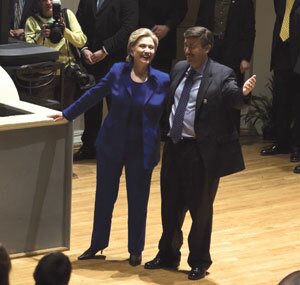NEWS- Wahoo-wonk: Clinton talks policy with UVA class

UVA professor Larry Sabato introduces Sen. Hillary Clinton (D-NY) to the UVA tradition of swaying back and forth to "The Good Ol' Song," as students serenade the presidential candidate at the conclusion of her question-and-answer session with them.
PHOTO BY JAY KUHLMANN
It's been over 30 years since she last taught a class for a living, but on the eve of Virginia's presidential primaries, former University of Arkansas School of Law professor Hillary Clinton (D-NY) taught UVA prof Larry Sabato's Introduction to American Politics.
"Politics is not a game," she told an audience that included some 500 students and a traveling press corps of reporters from such far-flung locales as Japan and Italy.
"It's not what you see on TV. It's not who's up and who's down, who's in, who's out. That's entertainment. There is a deep desire in our country to get back to believing in our politics."
Such was the former First Lady's message for her 70-minute question-and-answer session, which took place in UVA's Old Cabell Hall, where students asked Clinton mostly policy-based questions on everything from how she plans to pay for her universal heath care plan ("I'm thinking about ending the war in Iraq, which will save us a lot of money"), to the viability of ethanol as an energy solution ("It isn't the most efficient option, but it's what we have to start"), to her stance on the United Nations ("We've got to get the U.N. to function more efficiently; the way it's structured is really an anachronism").
Occasionally, she drew contrasts between herself and her rival for the Democratic nomination, Senator Barack Obama (IL).
On the issue of health care she said, "Economists and other independent evaluators have said my plan will reach universal coverage, and it's quite cost efficient. It's one of the big differences in this race between myself and Senator Obama. He doesn't have a plan for universal heath care."
She also took a swipe at the perception of his strong crossover appeal. "We're not going to carry Alaska, or North Dakota, or Idaho," she said referring to three red states in which Obama has defeated her in recent Democratic primaries.
Finally, she wondered how Obama will hold up when his past is subjected to the "full force and effect" of the Republican machine. "There's very little, if any, new information about me," she said. "It has been processed. It's been in the mental bank of America, and I think that's a huge advantage for me."
She also fought back against the notion she feels entitled to ascend to the presidency or has been planning to run for the White House all her life. "I never thought I would run for office," Clinton said.
However, she saved her sharpest barb for the presumptive Republican nominee, Arizona Senator John McCain.
"He didn't even vote on the stimulus package," Clinton said of her colleague. "He has said he doesn't really understand the economy."
But the moment that most seemed to capture students' attention came in response to a question about who was the most influential figure on her political career. She told a story about representing the U.S. at Nelson Mandela's inauguration as president of South Africa.
"He said, ‘There are three people here whom I personally invited, who I would like to introduce to you.' He proceeded to introduce three of his former jailers," she said, adding that he told the audience, "You have to give up whatever hate you have, you have to learn how to forgive."
The message may not have resonated very strongly with Luke Mancini, president of a conservative UVA group called the Burke Society. "My favorite expression," Mancini said, "is know thine enemy and always be aware of the other side."
However, first-year student Reed Arnold was "impressed with her articulateness." And Ryan Conner, a cofounder of Hoos for Hillary, said, "I saw some kids walking out who looked like traditional Republicans, and they said, ‘You know what? That wasn't as bad as I thought it'd be.'"
Sabato told his students that this class had hosted Presidents Ford, Carter, and Reagan, and that it's possible Clinton could be the next, calling her "a very substantive senator and presidential candidate." He urged his students to give Clinton "the standing ovation she deserves."
Whether the rest of Virginia's voters would stand and cheer for Clinton at the polls seemed less likely at press time. But regardless of how the votes fell, the fight continues into the coming weeks with primaries in Maryland and the District of Columbia, both of which carry big implications for momentum. Contests in Wisconsin and Hawaii for their combined 111 delegates happen this Tuesday, February 19, and another 370 will be up for grabs on Tuesday, March 4 in Ohio, Rhode Island, Texas, and Vermont.
A candidate must win at least 2,025 delegates to secure the nomination.
–with additional reporting by Megan Miller
#